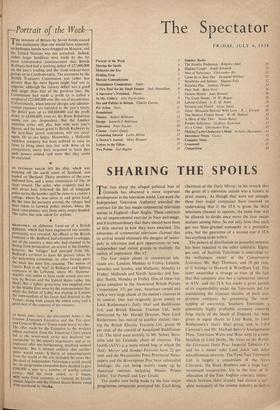Portrait , of the Week= P rim invasion of Britain by
Soviet forces caused I less excitement than one would have expected; no hydrogen bombs were dropped on Moscow, and the United Nations was not consulted. Indeed, rather larger headlines were made by the far more conventional announcement that British Railways had had a working deficit of £27,000,000 on the year's trading, and the cloak-and-car-boot . goings-on in Czechoslovakia. The statement by the British Transport Commission was rather less gloomy than the mere figures might lead one to suppose; although the railway deficit was a good deal larger than that of the previous year, the Commission had made a profit (it is called a surplus) of £23,000,000 over the rest of its activities. Unfortunately, when interest charges and adminis- tration expenses are included in the year's totals, the deficit goes up to £68,000,000 and the profit down to £4,000,000; even so, Sir Brian Robertson seems not too despondent. But the London omnibus strike will play hob with next year's figures, and the boost given to British Railways by the post-Suez petrol restrictions will not occur again. Or so one hopes. Meanwhile, a Midlands omnibus company has been ordered to raise its fares to bring them into line with those of its competitors; many were surprised to learn that such powers existed, and more that they could be exercised.
AN ESTONIAN SAILOR left his ship, which was trawling off the north coast of Scotland, and landed on Shetland. Thirty members of the crew followed him, and a scene reminiscent of The 39 Steps ensued. The sailor, who evidently had his wits about him, followed the line of telegraph poles across the heather until he came to .a crofter's cottage, where he was taken in and given food. By the time his pursuers arrived, the refugee had been taken to Lerwick police station, where the local constabulary sent them away empty-handed. The sailor has now asked for asylum.
MEANWHILE, an elaborate frame-up of a British diplomat, which had been engineered two months Previously, was revealed. An official at the British Embassy, a Mr. Bedford, had attempted to smuggle out of the country a man who had claimed to be fleeing from persecution; on arrival at the frontier, however, the 'refugee' had emerged from Mr. Bedford's car-boot to have his picture taken by the welcoming committee. In other foreign parts the week has been less amusing. The widow of Laszlo Rajk is on 'trial' in Budapest, and fighting continues in the Lebanon, where Mr. Hammar- skjold's visit seems to have made armed interven- tion by Britain and the United States rather less likely. But a lighter grace-note was supplied even to the Middle East news by the announcement that while the Sultan of Lahej was staying in London the commandant of his forces had deserted to the Yemen, along with almost the entire army and a good deal of the contents of the treasury.
AT How once more, the discussions betwen the London jransport Executive and the Trim ;port and General Workers' Union made heavy weAther. The offer made by the Executive to the workers whose exclusion from the Industrial Court award led to the seven-week strike was declared 'un- acceptable' by the union's negotiators, and as no improved offer was forthcoming, deadlock seemed inevitable. But it seemed unlikely that another strike would ensue. A flurry of announcements from the world of the arts included the news that the devil of Independent Television a monk would be; the programme companies have decided to give £100.000 a year to a number of worthy artistic causes. And the week ended, as it began, with news from overseas, as General de Gaulle visited Algeria and the United States Senate voted 49th-statehood to Alaska.






















































 Previous page
Previous page